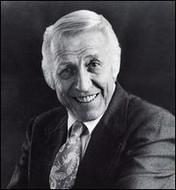 |
|
Stan Kenton Revisited George T. Simon Published 1971
he ever was to creating new musical sounds. He remains the tallest bundle of nerves in the music field. He's still driven by some sort of compulsive enthusiasm that even he probably can't explain, as he keeps trying to prove one, two or even several pointsall at the same time. In recent years he has fronted a large Los Angeles Neophonic Orchestra, which played concerts with a fair amount of success He has been running band clinics all over the country, uncovering, teaching, encouraging and developing young musicians with lots of help from members of his Orchestra. For the past several years he has spearheaded a continuing drive in Washington for federal legislation that would give copyright protection to arrangers and musicians. He has started his own record label, working out a deal with Capitol Records for his band's old masters, because he felt the company wasn't doing enough with them. At the same time, he continues to create and sell even more of his new material. And he still manages to go out on the road throughout each year, always with an enthusiastic, pro-Kenton
Stan has stayed as charming, as persuasive, as dogmatic as ever. He has grown more defensive, more reactionary (strange for one so dedicated to progressiveness in music), more bitter and somewhat disillusioned.
And he has slowed up a bit --- at least in his speech, for now, when he talks he actually uses punctuation! When I mentioned this to him in his Hollywood office, where he presides over his Creative World, Inc., enterprises he let loose with one of those typical Kenton guffaws. "Jesus Christ!" he bellowed. "Maybe I'm growing up!" Kenton has slowed in other ways, too, notably in his fervent, fearless campaign to sell, sell, sell himself and his progressive music. Now he admits that he "tried too hard to force things on people. But I've found that the fans can only go so fast; you can't lead them too fast. We made mistakes in year's back when we decided to just forge ahead and confronted audiences two hoursmaybe even two and a half hoursof music they had never beforenot one familiar thing. It used to be that years ago we had tension going all the time. That's where you were right in your original review of our band during our stay at the Rendezvous Ballroom in Balboa. But now there's not so much of it, because now I am able to do things in a more sensitive, sensible manner. These things come to you as you get older. You begin to say, 'Am I playing music for children or am I playing music for adults? Am I playing for mature people, people who have perception, or for people who have no perception?' You have to learn how to assess your audiences.
"You know, I used to believe that if you would be patient, you could almost make a jazz fan out of anybody. That'll never happen. I am now fully convinced that in order to love jazz music, a person has to be gifted with a certain amount of perception, and if they don't have that, they're never going to get it. It gets back to what Fats [ Waller] said years ago: 'If you don't know what it is, don't mess with it!' "And what about today's audiences? Do the kids have the proper perception, or shouldn't they be messing with jazz? Stan isn't sure. "I have a feeling that many of the young people are getting more sophisticated in their desires. A lot of them are through with this kindergarten music. But I still think that the big problem is that today's tunes are so adolescent. The lyrics are so childish. The melodies are so simple. As far as the Beatles are concerned, I think most of their music is still children's music.
When Stan wants to make a point, he talks very slowlyfor him. "If the Beatles can be credited with one thing," he almost drawled, "it is that they came along and they made fans out of six- and seven-year-old kids. They took it down that low. And the adults went for that stuff, because I think it's natural that an adult feels a kid is more perceptive and hip. And so they started looking at those things and started reading things into them. But there really wasn't anything there. It's just children's music. You compare the Beatles' lyrics with those of some great writers like Johnny Burke, Johnny Mercer, Jimmy Van Heusen or Sammy Cahnare we kidding each other? "Fifty percent of Americans arc beneath twenty-five years old today. Does that mean the rest of us have to live like kindergarteners? But radio is programmed today to appeal to the young kids. TV is now geared to the eight-and ten-year-old mentality. Where the hell do people go that are hungry something more sophisticated? Do they have to eat all that shit all the time? To me, you look at pop art and that's what you see on kindergarten walls*, That's not mature. There's nothing there." Kenton, as forceful, as hopeful, as conscientious as ever, would like to help fill that vacuum. "I'm in a position right now in my life to help a whole lot of people express themselves; help them find their identity; help clear up a whole lot the confusion today that's in the recording industry that is rank; help people discover what is the doughnut and not the hole. The important thing is to keep interested in people. What else counts? Birds and the sky and trees and all that crap? That doesn't really mean anything. The people are the most important thing. Obviously, he has grown beyond the man who for years seemed to be obsessed with only his music. "Now I deal in human beings all the time, just like ministers deal in human beings and football coaches deal in human beings. Bosses and executives and everybody deals in human beings, and whether you make wheelbarrows, whether you play music, whether you're in religion, your whole human obligation is how do you bring people out of themselves and make people out of human beings. You bring a young musician alongyou nurse himand all of a sudden he tells you to fuck yourself and he flies away. It's beautiful."
And just how beautiful is life for this hyperactive, almost sixty-year-old who has no thoughts of retiring? "I'll tell you this: I'm happier right now than I have I've ever been. I've gotten over a lot of things. I've passed a lot of goals I thought would be barometers of success and found they were only passing milestones to where you're supposed to go. I've long since stopped worrying about whether I'm going to be a millionaire or not. I don't give a shit about that."
And what about his role in the future of progressive music? "I could drop dead this moment and I'm sure that everything is going to be straight. No, whatever I may be able to do in my future life, I'm sure will be done by someone else anyway. What needs to be done will be done. But if I can help, then I just make it easier for people . . . That's all."
|
 Stan Kenton has never given up. He's as dedicated as
Stan Kenton has never given up. He's as dedicated as 